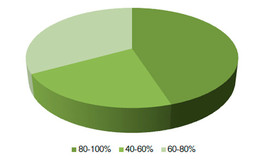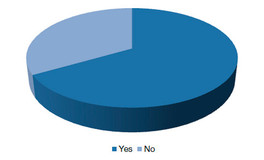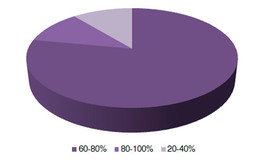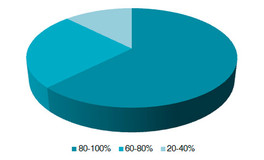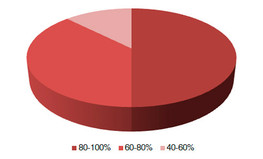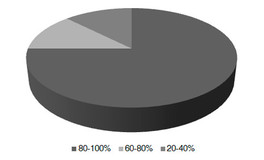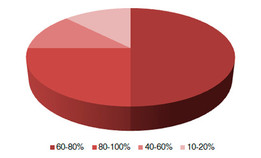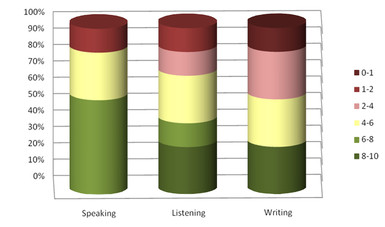Professional Applications in English for Architects
Unit 3. INTERVIEW QUESTIONS IN ARCHITECTURAL CONTEXTS
In this section, the figures below provide in a clear visual way, the results of a questionnaire that was designed to find out the importance of the architectural portfolio, and the most frequent questions a recruiter could ask in a standard architectural interview. This sample research was taken under the umbrella of the APLAI Innovation group during the course 2011-2012 and was part of a major research dealing with academic and professional needs. The questionnaire was sent to a sample of 80 English speaking architectural practices in order to find out the recruiters market requirements. The answers received are summarized in the following pie-charts, and are briefly commented to show the aspects currently evaluated by the interviewers in the work environment.
PRACTICE MARKET REQUIREMENTS
Information from the recruitments professionals
Motivation
75% of interviewers consider the applicant’s motivation to be important or very important. |
First Impression
64% of interviewers think first impressions are important. |
Social Interaction
78% of interviewers indicate that the social interaction (or lack of) is important. |
Good Portfolio/Bad Interview
55% of interviewers remember candidates with a very good portfolio failing the interview. |
The importance of a good Portfolio
63% of interviewers consider the portfolio to be very important. |
|
GETTING ALONG WITH YOUR PORTFOLIO |
||
Describing your projects
50% of interviewers consider the applicant’s explanations about his/her project to be very important. |
Images
75% of interviewers value the images of the applicant’s portfolio as very important. |
|
English knowledge
50% of interviewers indicate that the knowledge of English Language is important. |
Importance of Skills
57% of the interviewers consider Speaking to be important, whereas just 28% consider Writing as important. Listening is considered important by 43% of the interviewers. |
How important is it to have good communication in English when describing a project? An average of B2 (Advanced) English level upwards is required |
SUMMARY
Importance during Interview
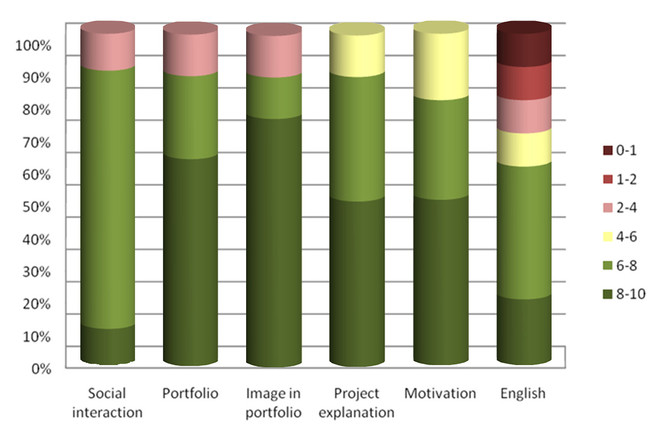
MOST COMMON QUESTIONS
1. Considering ways of beginning
Warm up questions
Talking about the Practice/Master Degree
2. Adding information
Talking about your portfolio
Talking about your skills
3. Considering ways of ending
Time for the candidate to ask
1. Considering ways of beginning
|
Warm up questions/ |
Talking about the Practice/Master Degree |
2. Adding information
|
Talking about your portfolio |
Talking about your skills |
3. Considering ways of ending
|
• Are you applying for other practices? Which ones? |
Time for the candidate to ask questions |
Now practise these questions with a friend!
This will help you
Turning negative into positive
In an interview it is very important to avoid getting caught in the trap of saying negative things about yourself. Here you will find some exercises to keep your answers positive.
Finish the following sentences
• Well, some people see me as ...
• Some of my friends think that I am ...
• Sometimes my teacher says that ...
• Although I really like to work with modeling I occasionally ...
• From time to time I ...
• A minor challenge might be if I ...
How would a friend describe you? And your favourite teacher?
Describe yourself using some of the “cream adjectives” given
• I am ...
How do you see yourself?
• I see myself as ...
Now answer the following questions using one of the previous sentences.
• What are your weaknesses?
• Tell me one of your weaknesses.
Examples: describing my skills at interviews
- My travel workshop trips around the world during my degree have brought me a clear understanding about other ways of understanding architecture overseas as well as a better approach to landscape.
- My projects experience during my degree supported by several high grades at the Technical University of Madrid have brought me a clear understanding and preparation for developing mature projects stages.
- I am very good at coming up with imaginative solutions when I have a problem preparing technical design.
- I actively seek feedback when implementing my design brief.
Now according to your own experience, write down two more similar sentences. Try to provide evidence of having
one of the following skills: Analytical, creativity, self confidence, communication, independence,
interpersonal skills, negotiation skills, self-awareness.
